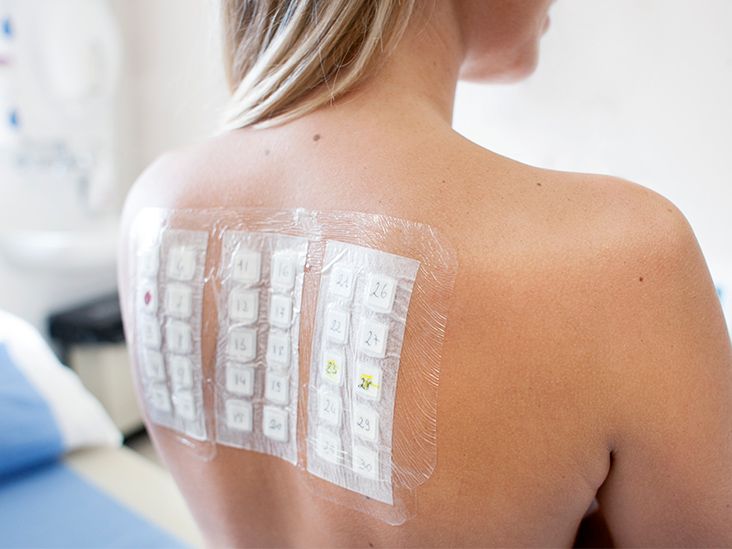
Should I Get Tested for Food Allergies If I Have Ulcerative Colitis?
- Select a language for the TTS:
- UK English Female
- UK English Male
- US English Female
- US English Male
- Australian Female
- Australian Male
- Language selected: (auto detect) - EN
Play all audios:

Bezzy communities provide meaningful connections with others living with chronic conditions. Join Bezzy on the web or mobile app.
Your guide on preventing and living with digestive health conditions
If you’re living with ulcerative colitis, testing may help identify which foods bother you, so that you can cut them out of your diet.
Ulcerative colitis (UC) cannot cause a food allergy, but some people with the condition may be allergic to certain foods, which, when consumed, may worsen symptoms.
Unlike a food intolerance, a food allergy happens when the immune system reacts to the proteins in certain foods. It can cause severe symptoms like shortness of breath and swelling of the
mouth and throat.
If you have food allergy symptoms, testing may help identify which foods bother you, so you can cut them out of your diet.
UC stems from a problem with the immune system, which can also be behind food allergies.
In food allergies, the immune system overreacts to usually harmless foods like milk or eggs. If you’re exposed to one of these foods, your immune system releases a protein called
immunoglobulin E (IgE).
When you’re exposed to your trigger food, IgE directs your body to release histamine. This chemical causes symptoms like wheezing and hives whenever you eat the offending food.
In UC, the immune system also overreacts and attacks the colon lining.
Typically, the gut acts like a barrier to prevent the immune system misfires that cause food allergies. However, in UC, inflammation damages the intestine and reduces this protective effect.
If you have a food intolerance, you may experience symptoms similar to those of UC whenever you eat that particular food. These can include:
Symptoms of a food allergy range from mild to severe, and can include:
The most severe form of food allergy is anaphylaxis. Symptoms include swelling in the throat, trouble breathing, a fast pulse, and dizziness. Anaphylaxis is a life-threatening medical
emergency that requires immediate treatment.
Severe symptoms like difficulty breathing and tightness of the throat require immediate medical attention. Call 911 or go to an emergency room right away.
If you regularly often get symptoms like belly pain, nausea, or diarrhea after you eat, consider speaking with a doctor. They can refer you to an allergist for testing.
Skin or blood tests can help your allergist figure out whether you have a food allergy. A skin allergy test involves placing a small piece of the suspected food just under your skin. If a
red bump forms, it’s a sign that you might be allergic to it.
A blood test checks for the antibody IgE in a sample of your blood. It may take a week or more for you to get results.
While these tests can be helpful in identifying food allergies, they can also produce false positives. This means the test may show you’re allergic to a food, even though you don’t have any
allergy symptoms when exposed to it.
If the test shows you’re allergic to a specific food, a doctor may recommend that you come into their office for an oral food challenge. You’ll be given a small amount of food while they
closely monitor you for signs of a reaction. This test provides quick results and is the most reliable way to confirm if you’re truly allergic.
One way to treat food allergies is by eliminating the offending foods from your diet. First, you need to figure out which foods cause you to react. You can do this by keeping a diary of
everything you eat for a few weeks.
Look for foods that are hard for some people with inflammatory bowel disease (IBD) to tolerate, such as:
Once you’ve identified a few possible trigger foods, cut them out of your diet. Then reintroduce the foods, one at a time, to see if your symptoms come back.
It’s important to be under a doctor’s or dietitian’s supervision when you try an elimination diet. Cutting foods out of your diet could leave you lacking important nutrients. Your dietitian
might recommend substituting other foods or taking a supplement to get the nutrition you need.
Immunotherapy is another treatment for food allergies. You’ll do this under the direction of an allergist. A doctor will give you very small amounts of the food that triggers your reaction.
Gradually, you’ll eat more and more of the food until your body begins to tolerate it.
Symptoms like bloating and diarrhea after you eat are most likely signs of a food sensitivity or intolerance.
If you think you may have a food allergy, testing may help identify which foods bother you, so you can cut them out of your diet.
Living with ulcerative colitis often feels like you're in the middle of a bad movie. These movie titles sum up what life with UC is like.
If you're struggling to decide whether to treat (or continue to treat) UC, it's important to know the risks involved in leaving UC untreated.
Shawntel Bethea has had ulcerative colitis since she was 17. Here are some of the reasons she still regularly sees the same gastroenterologist.
Whether these images inspire you, make you laugh, or simply put a smile on your face, we hope they help you get through the roughest moments with UC.
